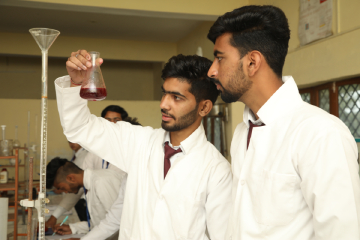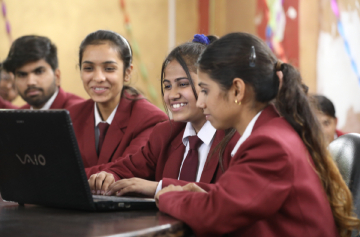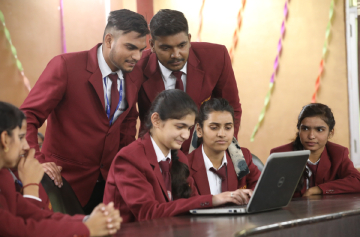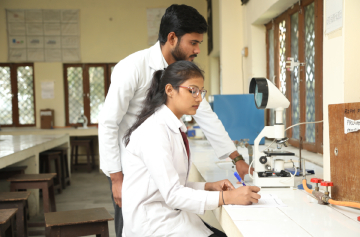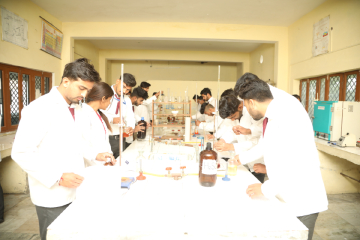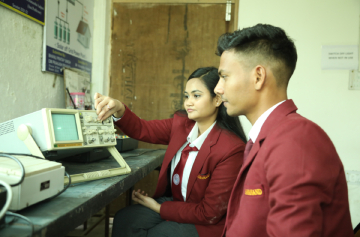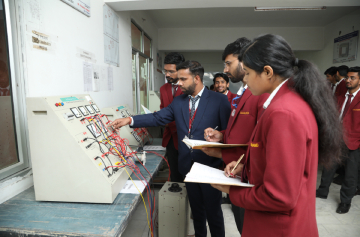Electrical engineering is a field of engineering that generally deals with the study and applications of electricity, electronics and electromagnetism. It has now diverged into a variety of domains including power engineering, control systems, RF engineering, instrumentation, MEMS.
Vision:
To be recognized as innovative centre of education providing state of the art education.
Mission:
To create knowledge base of the students & foster their capacity.
To develop the skills as per future requirement of the industry and be adaptable to the changes.
Programme Educational Objectives (PEOs):
PEO 1- Cater the needs of Indian as well as multinational industries.
PEO 2- Being competent with sound technical background.
PEO 3- Analyzing situation & understanding industrial problems, analysis & find the viable & feasible solution.
PEO 4- Make a successful career in industry/manufacturing sector.
PEO 5- Go for higher studies.
PEO 6- Must follow the never-ending process of “learning” throughout the life.
PEO 7- Being competent & fluent to enhance the effectiveness of communication.
PEO 8- Always follow ethics of the profession with the skills.
Programme Outcomes (POs):
PO 1- Engineering Knowledge: Apply the knowledge of mathematics, science, engineering fundamentals, and an engineering specialization to the solution of complex engineering problems.
PO 2- Problem Analysis: Identify, formulate, review research literature, and analyse complex engineering problems reaching substantiated conclusions using first principles of mathematics, natural sciences and engineering sciences.
PO 3- Design/Development of Solutions: Design solutions for complex engineering problems and design system components or processes that meet the specified needs with appropriate consideration for the public health and safety, and the cultural, societal, and environmental considerations.
PO 4- Conduct Investigations of Complex Problems: Use research-based knowledge and research methods including design of experiments, analysis and interpretation of data, and synthesis of the information to provide valid conclusions for complex problems:
that cannot be solved by straightforward application of knowledge, theories and techniques applicable to the engineering discipline as against problems given at the end of chapters in a typical text book that can be solved using simple engineering theories and techniques;
that may not have a unique solution. For example, a design problem can be solved in many ways and lead to multiple possible solutions;
that require consideration of appropriate constraints / requirements not explicitly given in the problem statement such as cost, power requirement, durability, product life, etc.;
which need to be defined (modelled) within appropriate mathematical framework; and
that often require use of modern computational concepts and tools, for example, in the design of an antenna or a DSP filter.
PO 5- Modern Tool Usage: Create, select, and apply appropriate techniques, resources, and modern engineering and IT tools including prediction and modelling to complex engineering activities with an understanding of the limitations.
PO 6- The Engineer and Society: Apply reasoning informed by the contextual knowledge to assess societal, health, safety, legal and cultural issues and the consequent responsibilities relevant to the professional engineering practice.
PO 7- Environment and Sustainability: Understand the impact of the professional engineering solutions in societal and environmental contexts, and demonstrate the knowledge of, and need for sustainable development.
PO 8- Ethics: Apply ethical principles and commit to professional ethics and responsibilities and norms of the engineering practice.
PO 9- Individual and Team Work: Function effectively as an individual, and as a member or leader in diverse teams, and in multidisciplinary settings.
PO 10- Communication: Communicate effectively on complex engineering activities with the engineering community and with society at large, such as, being able to comprehend and write effective reports and design documentation, make effective presentations, and give and receive clear instructions.
PO 11- Project Management and Finance: Demonstrate knowledge and understanding of the engineering and management principles and apply these to one’s own work, as a member and leader in a team, to manage projects and in multidisciplinary environments.
PO 12- Life-long Learning: Recognize the need for, and have the preparation and ability to engage in independent and lifelong learning in the broadest context of technological change.
